Iceman Thawing Out & Absolute Zero
The character Iceman has been under heavy fire since he came out in 2015 from fans across the spectrum. Older fans were upset that the "play boy womanizer" was gay and claimed that it was a diversity move to "put a gay on the team." The LGBTQ+ community jumped at this chance for representation in an iconic hero. The fandom seems to be torn on where it stands with homosexual Iceman (myself included).
The LGBTQ+ community functions as a very complex and layered minority figure. This is because of the different levels of prejudice that exist both inside and outside the community. Lets start with outside forces. As a whole the LGBTQ+ community has fought tooth and nail for equality and representation in media and entertainment. After years of hard work and fighting, we finally have a seat at the metaphoric table. LGBTQ+ characters are starting to appear more and more in television, anime, comics, and movies. However, the representation is always the same. LGBTQ+ people are consistently shown as sexually promiscuous, in toxic relationships, the sassy gay best friend, the in love with straight best friend (usually results in some type of violence), and/or their significant other is killed off (unless they are killed off). Here are some examples: Kevin: Riverdale, he's obsessed with wanting to loose his virginity, and even has a scene where he is cruising the woods for a sexual encounter. Shiro: Voltron, Toxic relationship with his boyfriend, ends up choosing the mission over him even though he has a disease that only gives him a few more years being able to be active, boyfriend is killed in action, Shiro gets a 2 second wedding scene during the series finale with an unnamed partner. Sara Lance: Legends of Tomorrow, She is our bisexual representation, relationship hops, known as the promiscuous one because shes always hooking up with both men and women, also portrays the stereotype of lesbian/bi women wanting to "flip" straight women. Sophia Burset: Orange is the New Black, puts a trans woman in prison, furthers the stereotype of POC going to prison while showing a trans woman serving time. This bothers me specifically when comparing it to the representation of Nomi Marks in Sense8. The list goes on, but I'm going to stop it here to not deviate to hard from the intentions of this post. I want to draw attention specifically to the LGBTQ+ community being used for tokenism while adhering to stereotypes. We have finally gotten the seat at the metaphorical table, but is having that seat worth having the stereotypes thrown back in our faces? This is a question I struggle with daily when thinking about media control over what we are allowed to see in entertainment.
My next background point is: the impact being LGBTQ+ has on ethnic minorities. This is where a lot of the LGBTQ+ community has issues with Iceman. Iceman fails to overtly state this. They had all of the tools at their disposal to make this point work, but it is only there if you, the reader, puts it together yourself. The "tools" here are the X-Men universe. Mutants can arguably be a place holder for every minority, and this is ignored entirely in Iceman :Thawing Out & Iceman: Absolute Zero. Arguably, being human and LGBTQ+ is easier than being LGBTQ+ and a mutant due to the added layers of prejudice. This is apparent in the real life LGBTQ+ community. It is incredibly more difficult to be an ethnic minority and LGBTQ+ than it is to be white and LGBTQ+. That being said, the narrative Iceman gives us is that of the white LGBTQ+ struggle. I am by no means discrediting the white LGBTQ+ struggle, only shedding light on the differences and added layers of prejudice that exist when you are an ethnic or religious minority as well as being LGBTQ+.
OK last point before we finally jump into Iceman: Thawing Out and Iceman: Absolute Zero. I wanted to draw attention to the LGBTQ+ on LGBTQ+ crime that is apparent between the community and source material. The LGBTQ+ community tends to be quick to bottom shame and feminine shame fictional characters of the same community. This happened in full force in Midnighter & Apollo #1. The argument was made (on the internet) that Midnighter was less of a man and super hero for being a bottom. This is a similar reaction many fans of Iceman (straight and LGBTQ+) had when he came out.
Keep all of this background information in mind as we dissect Iceman.
So we start off with Bobby, aka Iceman, training with a time displaced version of himself. Young Bobby has his gay identity more figured out that Adult Bobby. This is shown in the following scene:
We get a snap shot of a reverse mentor role. this is interesting to me because society and media tend to tell us mentors must be older than us. Adult Bobby is the mutant combat expert, but Young Bobby is the expert on being gay and out. I like this role reversal because it shows how a time displaced version of yourself has the potential to grow and evolve differently. Plot wise, I like that Young Bobby senses that something is wrong with Adult Bobby. He senses his loneliness and directionless situation. This is very common for LGBTQ+ people that come out later in life. Isolation is rampant due to generational differences and societal differences.
In addition to showing generational and societal differences, Iceman shows a very interesting scene:
If you are LGBTQ+ like myself, chances are you have had a very similar conversation with your family. My husband and I have been together almost 10 years and my immigrant grandfather still asks me if I have a girlfriend. What I like about this scene is the attention to Bobby not being out in addition to his parents not being accepting of his "mutant stuff." As mentioned above, the reader needs to put together the layers of prejudice for minority LGBTQ+ people here. Iceman is gay and a mutant. His parents can hardly handle him being an "out" mutant. This gives further reasoning and support to Iceman's delayed coming out.
This scene is done well visually. I like the attention to the agitation, shock, and frustration that is going on here. I like the layers that are embedded here. I like that his parents reject him as a mutant and a gay man. This double rejection ties into the minority LGBTQ+ coming out experience really well. I like that Sina Grace didn't make the Drakes total PFLAG parents. Often times in fiction, we tend to get the over the top PFLAG parents or the abusive "beat the gay out of you" parents. I like that they reject him, but in a more 50's era "we don't like change or differences, and you're already a mutant" kind of way. I like that his mom blames his dad's genetics for it as well. I've seen my own parents half joke about where my own gayness comes from as I also have a trans sibling (different mom). This moment was relevant to my own experience, and that made it resonate with me. I think this scene does a good job at capturing a rough coming out narrative for a straight audience. Coming out is such a personal and unique experience despite the rampant number of out LGBTQ+ people in the world. Bobby's is kind of generic and blanketed to cover as many aspects of as many stories as they possibly can. this isn't necessarily wrong or inauthentic, but as a gay audience member it pushes me away slightly. This could possibly be because it is too close to home for me and I'm rejecting it based on that, or that it just doesn't fully resonate with me. I tend to be turned off by coming out stories in works of fiction because they often feel forced, or too explanatory to me. Like many LGBTQ+ people I had a very unique coming out story. I was outed when I was a sophomore in high school so I did not have the choice or build up that a lot of fictitious work implies as common. Again, I have a unique experience as do most LGBTQ+ people which makes it difficult for writer to capture an experience that is 110% unique to you. That being said, I appreciate what this does in regards to awareness for the non-LGBTQ+ community.
I like the awkwardness of this scene. Bobby is still a "baby gay," and there is a vulnerability to him here that I think we have all had when we had our first crush. He has his team go with him to the bar, and I like the camaraderie here.
The LGBTQ+ community functions as a very complex and layered minority figure. This is because of the different levels of prejudice that exist both inside and outside the community. Lets start with outside forces. As a whole the LGBTQ+ community has fought tooth and nail for equality and representation in media and entertainment. After years of hard work and fighting, we finally have a seat at the metaphoric table. LGBTQ+ characters are starting to appear more and more in television, anime, comics, and movies. However, the representation is always the same. LGBTQ+ people are consistently shown as sexually promiscuous, in toxic relationships, the sassy gay best friend, the in love with straight best friend (usually results in some type of violence), and/or their significant other is killed off (unless they are killed off). Here are some examples: Kevin: Riverdale, he's obsessed with wanting to loose his virginity, and even has a scene where he is cruising the woods for a sexual encounter. Shiro: Voltron, Toxic relationship with his boyfriend, ends up choosing the mission over him even though he has a disease that only gives him a few more years being able to be active, boyfriend is killed in action, Shiro gets a 2 second wedding scene during the series finale with an unnamed partner. Sara Lance: Legends of Tomorrow, She is our bisexual representation, relationship hops, known as the promiscuous one because shes always hooking up with both men and women, also portrays the stereotype of lesbian/bi women wanting to "flip" straight women. Sophia Burset: Orange is the New Black, puts a trans woman in prison, furthers the stereotype of POC going to prison while showing a trans woman serving time. This bothers me specifically when comparing it to the representation of Nomi Marks in Sense8. The list goes on, but I'm going to stop it here to not deviate to hard from the intentions of this post. I want to draw attention specifically to the LGBTQ+ community being used for tokenism while adhering to stereotypes. We have finally gotten the seat at the metaphorical table, but is having that seat worth having the stereotypes thrown back in our faces? This is a question I struggle with daily when thinking about media control over what we are allowed to see in entertainment.
My next background point is: the impact being LGBTQ+ has on ethnic minorities. This is where a lot of the LGBTQ+ community has issues with Iceman. Iceman fails to overtly state this. They had all of the tools at their disposal to make this point work, but it is only there if you, the reader, puts it together yourself. The "tools" here are the X-Men universe. Mutants can arguably be a place holder for every minority, and this is ignored entirely in Iceman :Thawing Out & Iceman: Absolute Zero. Arguably, being human and LGBTQ+ is easier than being LGBTQ+ and a mutant due to the added layers of prejudice. This is apparent in the real life LGBTQ+ community. It is incredibly more difficult to be an ethnic minority and LGBTQ+ than it is to be white and LGBTQ+. That being said, the narrative Iceman gives us is that of the white LGBTQ+ struggle. I am by no means discrediting the white LGBTQ+ struggle, only shedding light on the differences and added layers of prejudice that exist when you are an ethnic or religious minority as well as being LGBTQ+.
OK last point before we finally jump into Iceman: Thawing Out and Iceman: Absolute Zero. I wanted to draw attention to the LGBTQ+ on LGBTQ+ crime that is apparent between the community and source material. The LGBTQ+ community tends to be quick to bottom shame and feminine shame fictional characters of the same community. This happened in full force in Midnighter & Apollo #1. The argument was made (on the internet) that Midnighter was less of a man and super hero for being a bottom. This is a similar reaction many fans of Iceman (straight and LGBTQ+) had when he came out.
Keep all of this background information in mind as we dissect Iceman.
So we start off with Bobby, aka Iceman, training with a time displaced version of himself. Young Bobby has his gay identity more figured out that Adult Bobby. This is shown in the following scene:
We get a snap shot of a reverse mentor role. this is interesting to me because society and media tend to tell us mentors must be older than us. Adult Bobby is the mutant combat expert, but Young Bobby is the expert on being gay and out. I like this role reversal because it shows how a time displaced version of yourself has the potential to grow and evolve differently. Plot wise, I like that Young Bobby senses that something is wrong with Adult Bobby. He senses his loneliness and directionless situation. This is very common for LGBTQ+ people that come out later in life. Isolation is rampant due to generational differences and societal differences.
In addition to showing generational and societal differences, Iceman shows a very interesting scene:
If you are LGBTQ+ like myself, chances are you have had a very similar conversation with your family. My husband and I have been together almost 10 years and my immigrant grandfather still asks me if I have a girlfriend. What I like about this scene is the attention to Bobby not being out in addition to his parents not being accepting of his "mutant stuff." As mentioned above, the reader needs to put together the layers of prejudice for minority LGBTQ+ people here. Iceman is gay and a mutant. His parents can hardly handle him being an "out" mutant. This gives further reasoning and support to Iceman's delayed coming out.
This brings us to the big bad of the comic run, Daken. Daken has a strange relationship with Bobby visually. It is difficult to place exactly what is happening. Here is a snapshot:
Daken is reviled as the big bad int his moment, but there seems to be an undertone of sexual tension and and awkwardness. The awkwardness works for me as Bobby is still exploring is life as a newly out gay man. However, this seems more like gay-baiting to me. Why is Daken suddenly more hands on with Bobby now that he's out? Why does it feel like Daken is trying to seduce Bobby now that he is out? The scene feels unnatural to me given the time frame. Why does a newly out gay Iceman also have a big bad that is seemingly LGBTQ+? This feels like a rhetorical suggestion that gay men can't have a straight man be the big bad because gay men are "less manly" than straight men. This scene rubs me the wrong way specifically because of the time it takes place in Bobby's coming out. It reads as a "here's another gay Iceman! Oh, but hes bad and toxic so don't fall for him. Oh, but hes into you though so watch out, gurl." I'm not into that categorization of LGBTQ+ villains and heroes.
Here we have our big bad toxic gay calling Bobby out on white privilege and sexual orientation insecurities. This misses the mark for me yet again. The tools were there to address the struggles of coming out, but it gets reduced to you're not #woke. I am also not a fan of the gay on gay sassy shade crime. This is something Viacom loves to showcase in their reality shows: gay men being cut throat and catty to each other. I'm still unsure on how the battle to get a stolen former x-kid back turned into a "catty gay fight" about sexuality insecurities. It feels forced and only there to remind the reader that Iceman came out.
Here is the coming out scene.
This scene is done well visually. I like the attention to the agitation, shock, and frustration that is going on here. I like the layers that are embedded here. I like that his parents reject him as a mutant and a gay man. This double rejection ties into the minority LGBTQ+ coming out experience really well. I like that Sina Grace didn't make the Drakes total PFLAG parents. Often times in fiction, we tend to get the over the top PFLAG parents or the abusive "beat the gay out of you" parents. I like that they reject him, but in a more 50's era "we don't like change or differences, and you're already a mutant" kind of way. I like that his mom blames his dad's genetics for it as well. I've seen my own parents half joke about where my own gayness comes from as I also have a trans sibling (different mom). This moment was relevant to my own experience, and that made it resonate with me. I think this scene does a good job at capturing a rough coming out narrative for a straight audience. Coming out is such a personal and unique experience despite the rampant number of out LGBTQ+ people in the world. Bobby's is kind of generic and blanketed to cover as many aspects of as many stories as they possibly can. this isn't necessarily wrong or inauthentic, but as a gay audience member it pushes me away slightly. This could possibly be because it is too close to home for me and I'm rejecting it based on that, or that it just doesn't fully resonate with me. I tend to be turned off by coming out stories in works of fiction because they often feel forced, or too explanatory to me. Like many LGBTQ+ people I had a very unique coming out story. I was outed when I was a sophomore in high school so I did not have the choice or build up that a lot of fictitious work implies as common. Again, I have a unique experience as do most LGBTQ+ people which makes it difficult for writer to capture an experience that is 110% unique to you. That being said, I appreciate what this does in regards to awareness for the non-LGBTQ+ community.
This concludes my current thoughts on Iceman: Thawing Out.
Lets jump into Iceman: Absolute Zero.
The second half of the collection is interesting. I like it better than the first half personally. We end up in a gay bar with Iceman pretty early on. Of course it is in West Hollywood which is a little eye rolling for me as I'm from Los Angeles.
Bobby finally meets his date. The date is really endearing, but i feel like the writing is intentionally setting Bobby up to fail. Media has taught us that when there is a "noobie" gay and an experianced gay the more experienced gay will leave the noobie so that the noobie can "grow." This also leads me to believe that the writing wants to keep Bobby single and gay rather than coupled and gay for the official canon.
This scene starts off cute, but then the last panel happens. This rhetorical move to remind the reader that Bobby tried being with women for a long history to assert him as "more manly" really bothers me. This is a theme throughout this series. Bobby constantly needs the catalyst of a woman to be gay. Kitty needs to be near by the entire first volume, and when she is absent in volume 2, Bobby needs to compare and contrast his interactions for the reader to understand. I'm not saying that gay men cant have a similar experience to Bobby, but this is a choice in the writing to keep comparing the two aspects of his life and sexual history.
Moving forward, Daken is back. He takes a dig at Bobby's inexperience as a gay man and kisses Bobby's boyfriend from the club. Daken doesn't say it, but there is an undertone that seems to suggest that he is more masculine than Bobby which makes him a "better" sexual partner.
They kiss and Bobby's boyfriend seems to be really into it from the art work. This pseudo love triangle thing that's kind of here is so out of place for me. Ask yourselves: if this were a straight man kissing and then throwing a woman, would we be as accepting of it existing? Would we count this as female representation if a straight woman was being used as the sexual plot device to develop Bobby's character? I hope your answer is "no this is not ok." This is yet again gay-baiting. Yes there's a gay scene and gay characters, but where is the substance?
They fight and now Iceman and Daken are kissing... Cool, I guess. Remember when the internet had a problem with Princess Jasmine from Aladdin kissing Jafar to hold his attention? That's what this scene does for me. It is hurtful to the gay experience, and LGBTQ+ people to be used as a plot device. I also don't like this notion of "kissing other people" being ok if it's the "hot minority gay." This adds into a fetishism of minority people, and into a greater fetish of open relationships which the gay community specifically has been stereotyped for having.
After that battle Bobby gets dumped. He's left with an "I'm still your ally" which is weird to me. Not-Bobby's Boyfriend makes a good point about the mutant world, specifically the X-Men world is too much for him to handle. However, this move seems calculated to keep Bobby the "single gay virgin" for his canonical run. This means that he can be gay without ever really being gay.
For clarification, I did enjoy the run. There were parts that I cringed at, but I genuinely enjoyed the read. I think a lot of that is do to how starved I am for any gay representation. I find myself trying to consume any gay narrative that I can find because I want to see myself distorted and reflected back through the metaphorical fun house mirror. It seems we can find plenty of stories featuring LGBTQ+ people, but are they good enough? What will it take to have LGBTQ+ characters that aren't in prison, promiscuous, toxic, invisible, or dead?
As always, thanks for reading. If you have any LGBTQ+ recommendations for me please let me know! I'm dying of starvation for them here.
-Tory





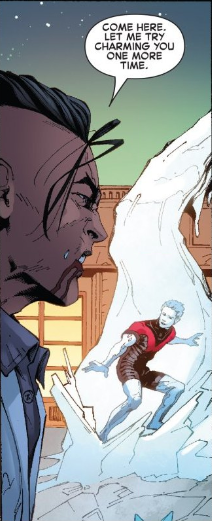
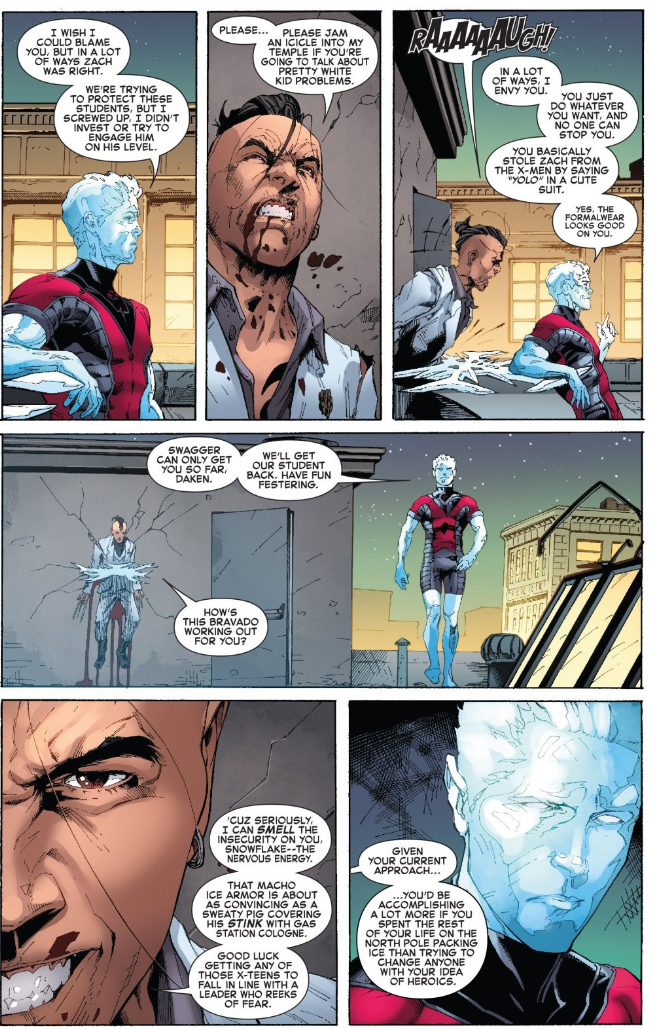


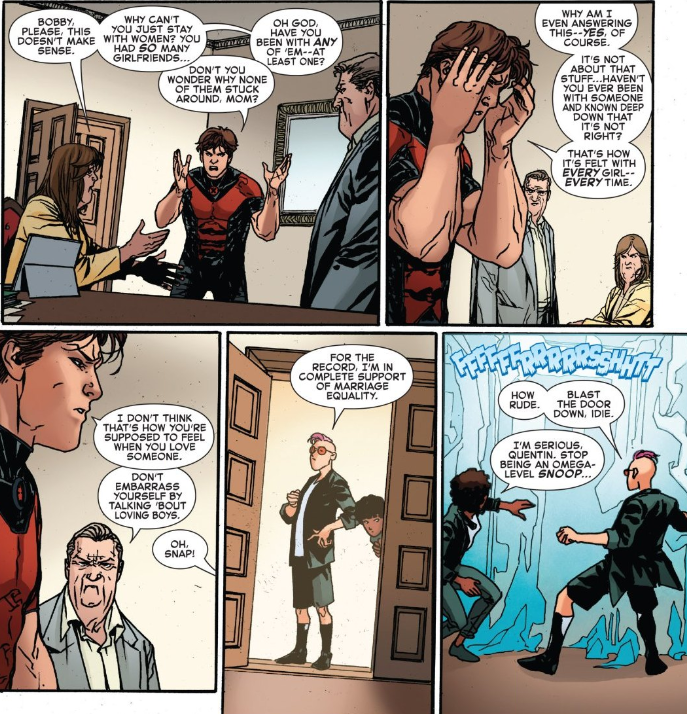





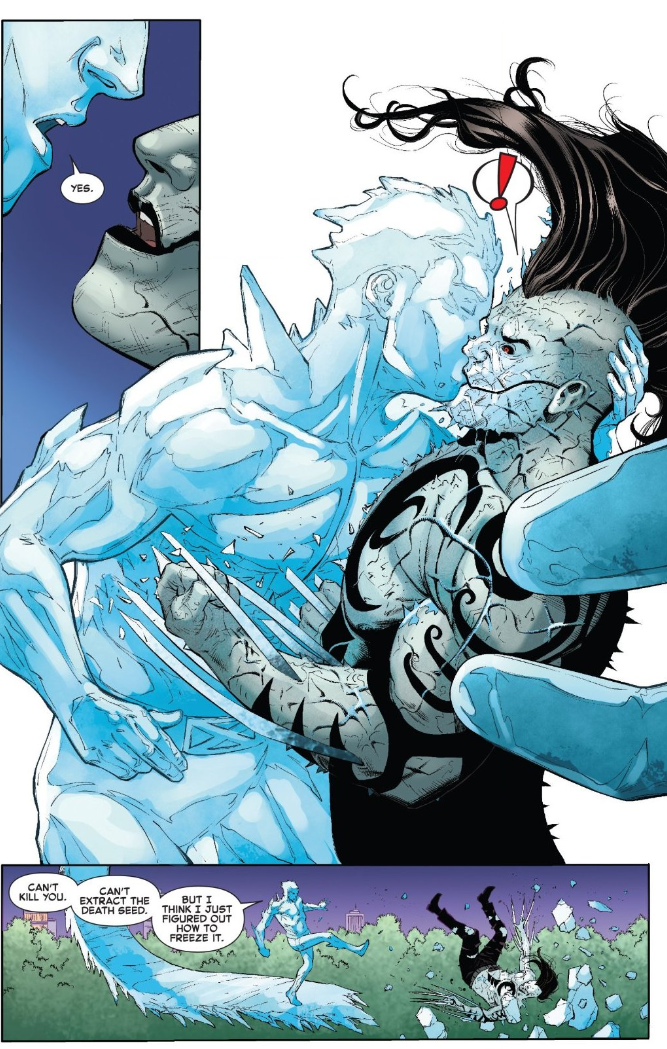
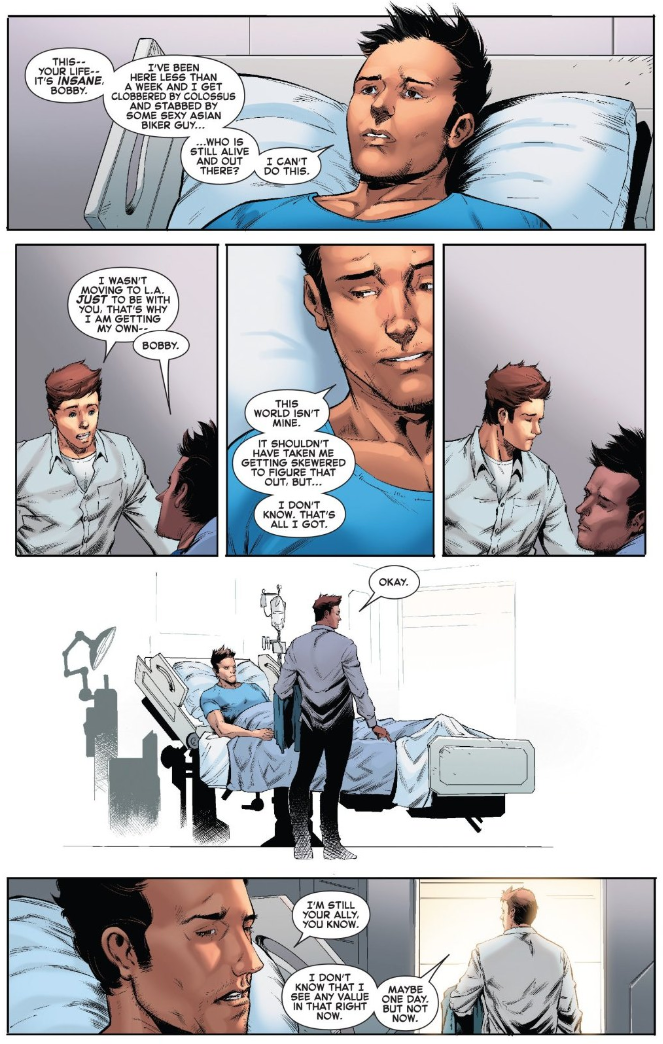

Comments
Post a Comment